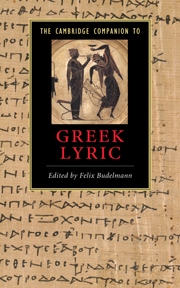Book contents
- Frontmatter
- Introducing Greek lyric
- Part I: Contexts and topics
- Part II: Poets and traditions
- Part III: Reception
- 16 Lyric in the Hellenistic period and beyond
- 17 Lyric in Rome
- 18 Greek lyric from the Renaissance to the eighteenth century
- 19 Sappho and Pindar in the nineteenth and twentieth centuries
- Epilogue
- 20 Lyric and lyrics: perspectives, ancient and modern
- Chronology of select melic, elegiac and iambic poets
- Further Reading
- Glossary
- List of works cited
- Index
18 - Greek lyric from the Renaissance to the eighteenth century
from Part III: - Reception
Published online by Cambridge University Press: 28 May 2010
- Frontmatter
- Introducing Greek lyric
- Part I: Contexts and topics
- Part II: Poets and traditions
- Part III: Reception
- 16 Lyric in the Hellenistic period and beyond
- 17 Lyric in Rome
- 18 Greek lyric from the Renaissance to the eighteenth century
- 19 Sappho and Pindar in the nineteenth and twentieth centuries
- Epilogue
- 20 Lyric and lyrics: perspectives, ancient and modern
- Chronology of select melic, elegiac and iambic poets
- Further Reading
- Glossary
- List of works cited
- Index
Summary
This chapter looks at a period with a decisive role in the formation of what we understand today as 'Greek lyric poetry'. The importance of this period is no smaller than and certainly not independent from other decisive periods in the creation of the idea of early Greek lyric, most notably those associated with Hellenistic scholarship, Roman poetry and the literature and criticism of later antiquity. To use post-Romantic period terminology, the era examined here spans from the emergence of Renaissance humanism to the classicism of the seventeenth century and the neo-classicism and early romanticism of the eighteenth century. The period under consideration begins with the appearance of the first printed editions and translations of Greek lyric poets in the sixteenth century. The invention of the printing press had an instrumental role in the rediscovery of Greek lyric poets and their dissemination as a collective body of poetry, as did the emergence and consolidation of lyric as a distinct genre of modern European poetry and literary theory. Greek lyric poetry had not entered the didactic, rhetorical and poetic canons of the Middle Ages in the West for a host of reasons related to its linguistic and metrical features and its thematic and generic preoccupations. Before the sixteenth century and the arrival from the East of learned scholars and important manuscripts, Greek lyric poets were virtually unknown, and their names were recycled largely for the attention they received in more canonical authors such as Horace and Cicero.
- Type
- Chapter
- Information
- The Cambridge Companion to Greek Lyric , pp. 336 - 351Publisher: Cambridge University PressPrint publication year: 2009
- 3
- Cited by



